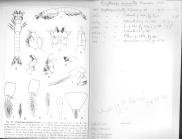WoRMS name details
Erythrops minuta Hansen, 1910
226716 (urn:lsid:marinespecies.org:taxname:226716)
unaccepted (Incorrect gender ending)
Species
marine, fresh, terrestrial
Hansen, H.J. (1910). The Schizopoda of the Siboga Expedition. -. <em>Siboga Exped., 37: 1-123, pls. 1-16.</em> [details] 
Depth range 0-93.5m
Taxonomic remark Email from Karl Wittmann to Jan Mees dd 8-9-2015: Many species names of Erythropinae are badly spelled. In those cases...
Depth range 0-93.5m [details]
Taxonomic remark Email from Karl Wittmann to Jan Mees dd 8-9-2015: Many species names of Erythropinae are badly spelled. In those cases...
Taxonomic remark Email from Karl Wittmann to Jan Mees dd 8-9-2015: Many species names of Erythropinae are badly spelled. In those cases where the genus name ends with "-ops" and the species name is an adjective, the name has to be transferred from female to male gender. [details]
Mees, J.; Meland, K. (Eds) (2012 onwards). World List of Lophogastrida, Stygiomysida and Mysida. Erythrops minuta Hansen, 1910. Accessed through: World Register of Marine Species at: https://www.marinespecies.org/aphia.php?p=taxdetails&id=226716 on 2024-11-20
![]() The webpage text is licensed under a Creative Commons Attribution 4.0 License
The webpage text is licensed under a Creative Commons Attribution 4.0 License
original description
Hansen, H.J. (1910). The Schizopoda of the Siboga Expedition. -. <em>Siboga Exped., 37: 1-123, pls. 1-16.</em> [details] 
taxonomy source Pillai, N. K. (1965). A review of the work of shallow-water Mysidacea of the Indian waters. <em>Proc. Symposium Crust.</em> 5: 1681-1728. [details] Available for editors [request]
[request]
additional source Shyamasundari, K. (1973). Mysidacea of Waltair coast. <em>Rivista biol., Univ. Perugia.</em> 66(4): 389-406. [details] Available for editors [request]
[request]
additional source Müller, H. G. (1993). World catalogue and bibliography of the recent Mysidacea. 238p. [details] Available for editors [request]
[request]
additional source Pillai, K.N. (1973). Mysidacea of the Indian Ocean. handbook to the International Zooplankton Collections 4; p.1-125; Indian Ocean Biological Centre; Kerala state, India [details] Available for editors [request]
[request]
additional source Pillai, N. K. (1965). A review of the work on the shallow water Mysidacea of the Indian waters. <em>Proceedings of the symposium on Crustacea.</em> 1681-1728.
page(s): 1704 [details]
additional source Tattersall, W. M. (1922). Indian Mysidacea. <em>Records of the Indian Museum.</em> 24: 445-504. [details]
additional source Hansen, H.J. (1910). The Schizopoda of the Siboga Expedition. -. <em>Siboga Exped., 37: 1-123, pls. 1-16.</em> [details]
additional source II, N. (1964). Fauna Japonica, Mysidae (Crustacea). <em>Biogeogr. Soc. Japan.</em> 610pp. [details] Available for editors [request]
[request]
additional source Tattersall, O. S. (1965). Report on a small collection of Mysidacea from the northern region of the Malacca Strait. <em>Journal of Zoology, London.</em> 147: 75-98. [details] Available for editors [request]
[request]
additional source Wooldridge, T. H.; Mees, J. (2011 onwards). World List of the Mysidacea. [details]
additional source Liu, J.Y. [Ruiyu] (ed.). (2008). Checklist of marine biota of China seas. <em>China Science Press.</em> 1267 pp. (look up in IMIS) [details] Available for editors [request]
[request]
additional source Tattersall, O.S. 1960. Report on a small collection of Mysidacea from Singapore waters.-- Proceedings of the Zoological Society of London 135: 165-181. [details] Available for editors [request]
[request]
additional source Mijin Kim, Sung Joon Song, Won Kim (2012). First Record of the Mysids, Genus Erythrops(Crustacea: Mysida: Mysidae)from Korea. Anim. Syst. Evol. Divers. 28(2): 97-104 [details]
taxonomy source Pillai, N. K. (1965). A review of the work of shallow-water Mysidacea of the Indian waters. <em>Proc. Symposium Crust.</em> 5: 1681-1728. [details] Available for editors
additional source Shyamasundari, K. (1973). Mysidacea of Waltair coast. <em>Rivista biol., Univ. Perugia.</em> 66(4): 389-406. [details] Available for editors
additional source Müller, H. G. (1993). World catalogue and bibliography of the recent Mysidacea. 238p. [details] Available for editors
additional source Pillai, K.N. (1973). Mysidacea of the Indian Ocean. handbook to the International Zooplankton Collections 4; p.1-125; Indian Ocean Biological Centre; Kerala state, India [details] Available for editors
additional source Pillai, N. K. (1965). A review of the work on the shallow water Mysidacea of the Indian waters. <em>Proceedings of the symposium on Crustacea.</em> 1681-1728.
page(s): 1704 [details]
additional source Tattersall, W. M. (1922). Indian Mysidacea. <em>Records of the Indian Museum.</em> 24: 445-504. [details]
additional source Hansen, H.J. (1910). The Schizopoda of the Siboga Expedition. -. <em>Siboga Exped., 37: 1-123, pls. 1-16.</em> [details]
additional source II, N. (1964). Fauna Japonica, Mysidae (Crustacea). <em>Biogeogr. Soc. Japan.</em> 610pp. [details] Available for editors
additional source Tattersall, O. S. (1965). Report on a small collection of Mysidacea from the northern region of the Malacca Strait. <em>Journal of Zoology, London.</em> 147: 75-98. [details] Available for editors
additional source Wooldridge, T. H.; Mees, J. (2011 onwards). World List of the Mysidacea. [details]
additional source Liu, J.Y. [Ruiyu] (ed.). (2008). Checklist of marine biota of China seas. <em>China Science Press.</em> 1267 pp. (look up in IMIS) [details] Available for editors
additional source Tattersall, O.S. 1960. Report on a small collection of Mysidacea from Singapore waters.-- Proceedings of the Zoological Society of London 135: 165-181. [details] Available for editors
additional source Mijin Kim, Sung Joon Song, Won Kim (2012). First Record of the Mysids, Genus Erythrops(Crustacea: Mysida: Mysidae)from Korea. Anim. Syst. Evol. Divers. 28(2): 97-104 [details]
 Present
Present  Present in aphia/obis/gbif/idigbio
Present in aphia/obis/gbif/idigbio  Inaccurate
Inaccurate  Introduced: alien
Introduced: alien  Containing type locality
Containing type locality
From editor or global species database
Depth range 0-93.5m [details]Habitat a coastal shallow-water form, found often among weeds [details]
Taxonomic remark Email from Karl Wittmann to Jan Mees dd 8-9-2015: Many species names of Erythropinae are badly spelled. In those cases where the genus name ends with "-ops" and the species name is an adjective, the name has to be transferred from female to male gender. [details]


